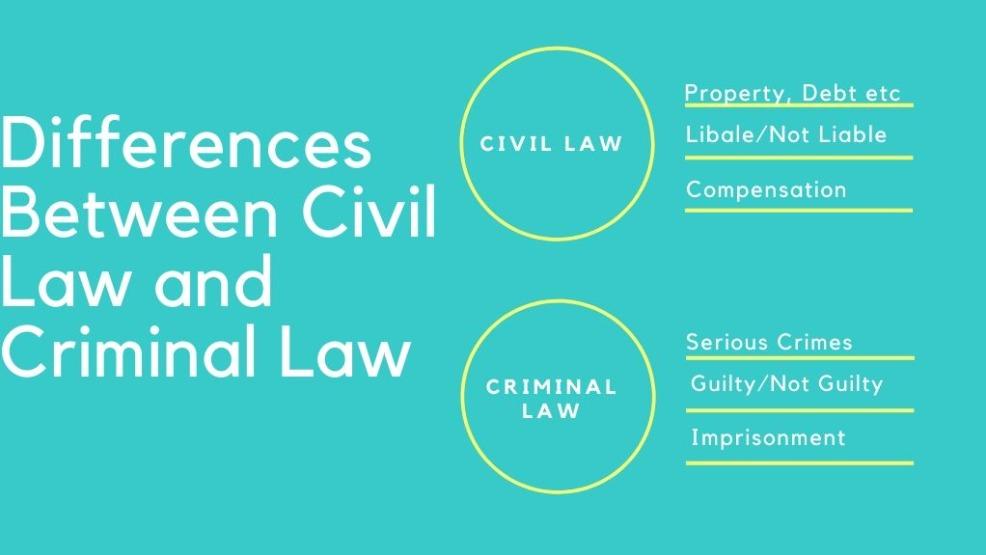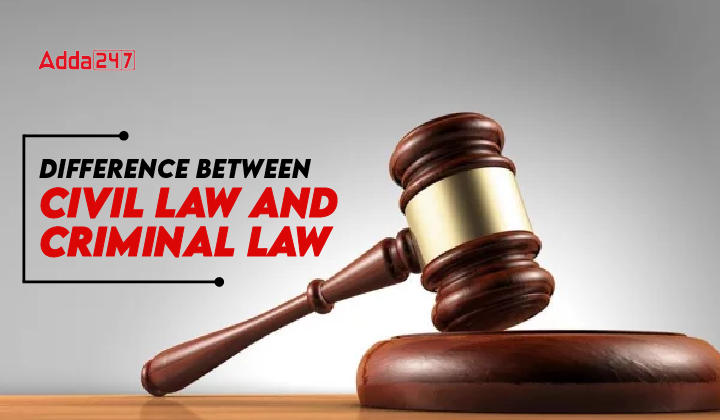Table of Contents
In our legal system, two types of laws are widely known: Civil law and Criminal Law. In Simple words, Civil and Criminal laws are familiar to everyone and form the backbone of our legal framework. In a populous country like India, various incidents occur regularly, falling under either Civil or Criminal categories. Unfortunately, such occurrences are on the rise, prompting a closer look at our legal system’s effectiveness. While Civil and Criminal laws differ significantly, both aim to uphold peace, safety and a structured society. Additionally, in this blog, we’ve recommended books on criminal law and civil law to deepen your understanding of these topics.
Difference Between Civil Law and Criminal Law
| Aspect | Civil Law | Criminal Law |
| Purpose | Resolving disputes between individuals or entities |
Punishing offences against society
|
| Plaintiff/Prosecution Burden | A plaintiff bears the burden of proof |
The prosecution bears the burden of proof
|
| Outcome | Typically results in monetary compensation or court orders |
Can result in imprisonment, fines, or probation
|
| Nature of Cases | Contract disputes, property issues, personal injury |
Theft, assault, murder, and other crimes
|
| Objective | Compensation or enforcement of agreements |
Maintaining public order and safety
|
| Standard of Proof | Preponderance of evidence |
Guilt beyond a reasonable doubt
|

Civil Law
Civil law is an important branch of our legal system, that specializes in resolving disputes between parties, which can include individuals, organizations, and businesses. Often referred to as non-criminal or private law, civil law plays a crucial role in addressing various personal matters affecting citizens’ lives.
These matters encompass property disputes, ownership issues, marital affairs, insurance claims, child custody disputes, and copyright disputes. The primary focus of civil law is to settle conflicts between individuals and organizations, typically by providing fines or compensation to the court or the aggrieved party involved in the dispute.
Parties involved in Civil Law:
- Plaintiff and Defendant: In civil cases, the primary parties are the plaintiff, who files the lawsuit, and the defendant, against whom the lawsuit is filed. The plaintiff claims harm, injury, or violation of rights caused by the defendant and seeks legal remedy from the court.
- Attorneys: Each party in a civil case is represented by an attorney or legal counsel who advocates for their client’s interests and presents their case before the judge.
- Third Parties: Occasionally, third parties may become involved in civil cases as witnesses or impleaded parties.
- Witnesses: Witnesses are individuals who provide factual information or evidence relevant to the case.
- Judge: The judge oversees the legal proceedings, ensures adherence to legal procedures, and renders judgments on matters of law. They maintain courtroom decorum, handle objections, and ultimately decide the outcome of the case if it proceeds to trial.
Features of Civil Law
- Disputes between Private Individuals and Organizations: Civil law primarily addresses conflicts between private individuals and organizations.
- Protection of Rights and Dispute Resolution: Civil law safeguards the rights of the parties involved and resolves disputes promptly and efficiently, guided by principles of justice, fairness, and the rule of law.
- Verdicts by Judges or Panels: Cases in civil law are typically decided by a judge or a panel of judges.
- Lower Burden of Proof: Compared to criminal cases, the burden of proof is lower in civil law cases.
- Remedies: In civil law cases, remedies usually involve monetary compensation rather than fines or imprisonment.
Criminal Law
Criminal law is a crucial aspect of the legal system that deals with offences against society as a whole. Here are some key points about criminal law:
- Offences Against Society: Criminal law focuses on acts that are deemed harmful to society, such as theft, assault, murder, and drug trafficking. These offences are prosecuted by the state or government rather than by individual victims.
- Punishment and Deterrence: The primary goal of criminal law is to punish offenders for their actions and to deter others from committing similar crimes. Punishments for criminal offenses can include imprisonment, fines, probation, or community service.
- Burden of Proof: In criminal cases, the burden of proof lies with the prosecution, which must demonstrate the defendant’s guilt beyond a reasonable doubt. This high standard is intended to protect individuals from wrongful conviction and incarceration.
- Legal Procedures: Criminal proceedings typically involve various legal procedures, including arraignment, pre-trial hearings, trial by jury or judge, and sentencing. Defendants have the right to legal representation and a fair trial.
- Presumption of Innocence: Central to criminal law is the principle of “presumption of innocence,” which holds that a defendant is considered innocent until proven guilty in a court of law. This principle ensures that defendants are treated fairly and afforded due process rights.
- Types of Crimes: Criminal offences are categorized into different types, including misdemeanours and felonies, based on their severity and potential punishment. Misdemeanours are less serious crimes, while felonies are more serious offences that often carry harsher penalties.
- Public Safety: Criminal law plays a crucial role in maintaining public safety and order by holding individuals accountable for their actions and deterring criminal behaviour. Law enforcement agencies investigate crimes, gather evidence, and arrest suspects to uphold the law and protect communities.
Parties Involved in Criminal Law
Parties involved in Criminal law play distinct roles that ensure fair proceedings and adherence to legal standards:
- Prosecution: Representing the state or government, the prosecution’s main duty is to bring charges against the defendant and present evidence to prove guilt. Led by a government attorney, they aim to uphold justice on behalf of society.
- Defendant: The individual accused of committing a crime. They have the right to legal representation, either through a retained attorney or a court-appointed one if unable to afford legal counsel. The defendant can plead guilty or not guilty to the charges brought against them.
- Judge: Overseeing the criminal case, the judge ensures adherence to legal procedures and fairness throughout proceedings. They make rulings on legal matters and may determine sentencing if the defendant is found guilty or pleads guilty.
- Witnesses: Individuals with relevant information or evidence related to the case, called upon by both parties to testify.
- Victims: In some cases, there is a victim who has suffered due to the alleged crime. Victims have the opportunity to provide impact statements during court proceedings, allowing their voices to be heard.
Features of Criminal Law
- Criminal law focuses on offences against society as a whole, rather than disputes between parties.
- It entails the imposition of punishments and penalties on those found guilty of criminal offences, aiming to uphold societal norms and public safety.
- The burden of proof is higher in criminal cases compared to civil cases, ensuring the defendant’s guilt is established beyond a reasonable doubt.
- Criminal cases are initiated and conducted by government attorneys, representing the interests of the state.
- Remedies in criminal cases may include imprisonment, fines, or a combination of both, reflecting the seriousness of the offence and serving as a deterrent against future criminal behaviour.



 TSPSC Group 1 Question Paper 2024, Downl...
TSPSC Group 1 Question Paper 2024, Downl...
 TSPSC Group 1 Answer key 2024 Out, Downl...
TSPSC Group 1 Answer key 2024 Out, Downl...
 Cabinet Ministers of India 2024, New Cab...
Cabinet Ministers of India 2024, New Cab...







